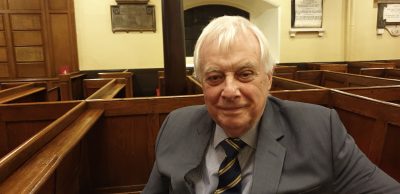
By Sarah Mac Donald - 02 March, 2020

Baron Chris Patten of Barnes at St Anne’s Church, Dawson Street, Dublin. Photo: Sarah Mac Donald.
The former Chairman of the Conservative Party, Baron Patten of Barnes, paid tribute to Peter Sutherland, the former Director-General of the World Trade Organisation and European Commissioner for Competition in Dublin last week.
Baron Patten chaired the Independent Commission on Policing for Northern Ireland which produced a series of far-reaching proposals for more inclusive policing arrangements for the North including rebranding the RUC as the PSNI and 50:50 recruitment.
In his address at St Anne’s Church on Dublin’s Dawson Street on the topic ‘The Future of Liberal Democracy’, the former Conservative Minister said Peter Sutherland led the world to the conclusion of “the biggest trade agreement in history in 1993”.
The General Agreement on Tariffs and Trade was then transformed into the World Trade Organisation. “There has been nothing like it since to change so many lives economically mostly for the better; nor does there appear much likelihood of anything like it happening again any time soon,” he said.
Baron Patten recalled how he first met Peter Sutherland when he was Ireland’s Attorney General and Patten was a junior minister in Northern Ireland.
“As a Catholic of Irish heritage, I was thought more likely than most Conservatives to be a more or less acceptable spokesman for British government policy on the North in the United States, from Washington to Boston to Los Angeles.”
“I agreed with him about the efficacy of markets but also that they needed to be competitive, regulated and balanced in favour of equity and social responsibility. Like him, I believed that my country should embrace international cooperation and be a whole-hearted member of the European Union. I disagreed with him about the pace and scope of European integration, a consequence in some ways of our countries of birth.”
He said Peter Sutherland was a public servant who was more able than most whom he had known at translating big ideas into practical policy.
“That was true of his work on Europe’s single market, on competition policy and as I have said on trade.”
“He launched the Erasmus programme designed to help European students to attend universities across the Union. He championed the rights of refugees and an understanding of demography and its impact on migration.”
Recalling how their paths had crossed at BP and at Oxford, where Sutherland lectured and helped one of the smaller colleges, the Benedictine foundation St Benet’s Hall, begin the task of securing its future, Baron Patten described Peter Sutherland as loyal to the values and principles of a liberal democrat, and said he was a “decent, moderate, Catholic, an Irish internationalist patriot”.
“He was one of those who helped to shape a better world in the second half of the last century, while exemplifying in word and deed the attributes that created it”.
He made his comments at the start of a lecture which was organised by the Jesuit quarterly journal, ‘Studies’ in honour of Peter Sutherland, who was a patron of the publication.
In his address, Baron Patten said that in a liberal democracy, the responsible exercise of liberty is guaranteed first by the rule of law with independent courts and judges, working within a legal structure determined in a constitutional settlement.
But he noted that if politicians overstep their powers, they could be held to account by the courts. “Sometimes when this has happened, even recently, the judges have been called ‘enemies of the people’”.
“In fact, they have been the guardians of arrangements which protect the people. Bertolt Brecht wrote, ‘All power comes from the people. But where does it go?’ The judges help to make certain that it is not hoovered up by an executive which defies accountability.”
His main argument was the extent to which the ideas of liberal democracy are under threat around the world from within free societies and from outside.
The former Chairman of the BBC Trust (2011 to 2014) highlighted the importance of a free press as well as freedom of assembly and of speech in helping citizens in a democracy to understand and influence public decisions and to hold the executive to account for what it is doing.
“I would not want to depend on Fox News to be informed. It is notable that even when it is under the most severe criticism, for example during the months of the Saville scandal, public trust in the BBC is vastly greater than in other media organisations,” he said.
Elsewhere in his address, he underlined that while a democracy should practice civic egalitarianism – all should be treated in the same way – there are limits to what the majority should be allowed to do.
“These decent limits can go beyond laws; they incorporate behaviour and a generous sense of how citizens should behave. Not only should the minority be assured of its rights – and a sensible majority takes account of the minority’s concerns – but in addition all minorities are protected from any exclusion from civic fair play.”
Baron Patten said this was especially important in protecting immigrant groups, often distinctive in appearance and language, from the Hobbesian effects of what would be similar to the threats made by Athens to the Delians recorded in Thucydides, ‘The strong do what they can and the week suffer what they must’.”
He also warned that “If ‘left behinds’ feel victims of a system that not only hammers their hopes but looks down on their opinions and aspirations, it is not easy to attract their civic loyalty.”